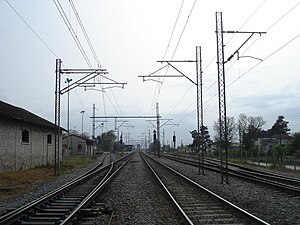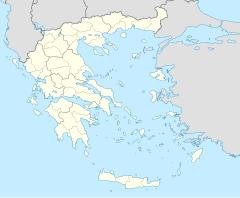Platy railway station (Greek: Σιδηροδρομικός σταθμός Πλατέος, romanized: Sidirodromikós stathmós Platéos) is the railway station of Platy in Imathia, Central Macedonia, Greece. Opened in 1894 in what was then the Ottoman Empire, it is located southwest of the residential area, at the junction of the Piraeus–Platy railway and Thessaloniki–Bitola railway 1.3 kilometres (0.81 mi) southwest of the town centre. The station is served by Intercity trains between Athens and Thessaloniki and since 9 September 2007 by Thessaloniki Suburban services or Proastiakos to Katerini and Larissa, Edessa, Florina and Thessaloniki.[4]
Πλατύ Platy | |||||||||||||||||||||||||
|---|---|---|---|---|---|---|---|---|---|---|---|---|---|---|---|---|---|---|---|---|---|---|---|---|---|
 Approaches to Platy railway station, April 2008 | |||||||||||||||||||||||||
| General information | |||||||||||||||||||||||||
| Location | Alexandria 590 32, Platy Imathia Greece | ||||||||||||||||||||||||
| Coordinates | 40°38′11″N 22°31′47″E / 40.6365°N 22.5296°E | ||||||||||||||||||||||||
| Owned by | GAIAOSE[1] | ||||||||||||||||||||||||
| Line(s) | |||||||||||||||||||||||||
| Platforms | 4 (1 disused) | ||||||||||||||||||||||||
| Tracks | 6 | ||||||||||||||||||||||||
| Train operators | Hellenic Train | ||||||||||||||||||||||||
| Construction | |||||||||||||||||||||||||
| Structure type | at-grade | ||||||||||||||||||||||||
| Platform levels | 1 | ||||||||||||||||||||||||
| Parking | Yes | ||||||||||||||||||||||||
| Accessible | |||||||||||||||||||||||||
| Other information | |||||||||||||||||||||||||
| Status | Staffed | ||||||||||||||||||||||||
| Website | http://www.ose.gr/en/ | ||||||||||||||||||||||||
| History | |||||||||||||||||||||||||
| Opened | 1894 | ||||||||||||||||||||||||
| Electrified | 25 kV 50 Hz AC[2][3] | ||||||||||||||||||||||||
| Services | |||||||||||||||||||||||||
| |||||||||||||||||||||||||
| |||||||||||||||||||||||||
History
editOpened in 1894 in what was then the Ottoman Empire, at the completion of the Société du Chemin de Fer ottoman Salonique-Monastir, a branchline of the Chemins de fer Orientaux from Thessaloniki to Bitola. During this period Northern Greece and the southern Balkans were still under Ottoman rule, and Adendro was known as Kirtzilar. Adendro was annexed by Greece on 18 October 1912 during the First Balkan War. On 17 October 1925, The Greek government purchased the Greek sections of the former Salonica Monastir railway,[5] and the railway became part of the Hellenic State Railways, with the remaining section north of Florina seeded to Yugoslavia. In 1970 OSE became the legal successor to the SEK, taking over responsibilities for most of Greece's rail infrastructure. On 1 January 1971, the station and most of the Greek rail infrastructure were transferred to the Hellenic Railways Organisation S.A., a state-owned corporation. Freight traffic declined sharply when the state-imposed monopoly of OSE for the transport of agricultural products and fertilisers ended in the early 1990s. Many small stations of the network with little passenger traffic were closed down. In 2001 the infrastructure element of OSE was created, known as GAIAOSE; it would henceforth be responsible for the maintenance of stations, bridges and other elements of the network, as well as the leasing and the sale of railway assists.[1] In 2003, OSE launched "Proastiakos SA", as a subsidiary to serve the operation of the suburban network in the urban complex of Athens during the 2004 Olympic Games. In 2005, TrainOSE was created as a brand within OSE to concentrate on rail services and passenger interface.
On 9 September 2007, the station reopened. Since 2007, the station is served by the Proastiakos Thessaloniki services to New Railway Station. In 2008, all Proastiakos were transferred from OSE to TrainOSE. In 2009, with the Greek debt crisis unfolding OSE's Management was forced to reduce services across the network. Timetables were cut back, and routes closed as the government-run entity attempted to reduce overheads. In 2017 OSE's passenger transport sector was privatised as TrainOSE, currently, a wholly owned subsidiary of Ferrovie dello Stato Italiane[6] infrastructure, including stations, remained under the control of OSE.
Facilities
editThe station has waiting rooms and a staffed ticket office within the original 19th-century building. As of (2020) The station is staffed with a working ticket office. The station currently has four platforms; however, only three are currently in regular use. There are waiting rooms on platform one and waiting shelters on 2/3. Access to the platforms is via a subway under the lines. The platforms have shelters with seating; however, there are no Dot-matrix display departure and arrival screens or timetable poster boards on the platforms. The station, however, does have a buffet. There is also Parking in the forecourt.
Services
editThe station is served by Regional stopping services to Palaiofarsalos and Thessaloniki,[4] Express trains to Kalambaka and Florina and InterCity services between Athens and Thessaloniki, and since 9 September 2007 by Proastiakos Thessaloniki services to Katerini and Larissa, Edessa, and Thessaloniki.[4]
Station layout
edit| L Ground/Concourse |
Customer service | Tickets/Exits |
| Level Ε1 |
Out of use | |
| Platform 3a | towards Florina (Alexandria) ← | |
| Platform 3b | Π2 towards Edessa (Leianovergi) ← | |
| Side platform, doors on the right/left | ||
| Platform 1a | towards Athens (Katerini) ← | |
| Platform 1b | Π1 towards Larissa (Aiginio) ← | |
| Platform 2a | towards Thessaloniki (Terminus) → | |
| Platform 2b | Π1 towards Thessaloniki (Adendro) → | |
| Platform 2c | Π2 towards Thessaloniki (Adendro) → | |
| Island platform, doors open on the right/left | ||
| Platform 4 | In non-regular use | |
| Side platform, doors on the right | ||
See also
editReferences
edit- ^ a b "Home". gaiaose.com.
- ^ a b c "Annexes". Network Statement (PDF) (2023 ed.). Athens: Hellenic Railways Organization. 17 January 2023. pp. 1–2, 5–6. Archived from the original (PDF) on 24 September 2023. Retrieved 24 September 2023.
- ^ "SDCEM : Tithorea Domokos High Speed Line - Railway Electrification project". Archived from the original on 2021-07-24. Retrieved 2020-10-26.
- ^ a b c TrainOSE 2013 timetable Archived 2013-01-19 at the Wayback Machine
- ^ Le Journal des finances, 15 janvier 1926 (in French)
- ^ "It's a new day for TRAINOSE as FS acquires the entirety of the company's shares". ypodomes.com. Retrieved 14 September 2017.
